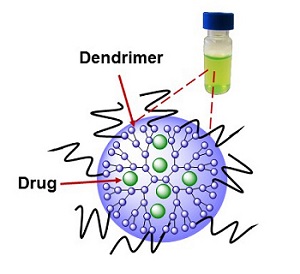 |
| An illustration showing the naphthalocyanine molecule with a water-soluble dendrimer--Courtesy of Oregon State University |
Researchers at Oregon State University have adapted a known molecule so that it sticks to cancer cells, opening up a new approach to better identifying tumors for surgical removal while providing a follow-up attack on any remaining malignant cells, helping to prevent the cancer from making a comeback.
The molecule is naphthalocyanine and the team adapted it with a water-soluble dendrimer "which allows the naphthalocyanine to hide within a molecule that will attach specifically to cancer cells, and not healthy tissue. The dendrimer, an extremely tiny nanoparticle, takes advantage of certain physical characteristics that blood vessels leading to cancer cells have, but healthy ones do not. It will slip easily into a tumor but largely spare any healthy tissue."
Exposed to light, the cancer cells can start to glow, offering a beacon to surgeons, while prolonged exposure can heat up cancer cells and destroy any that are left behind.
"For many cancers, surgery is a first choice of treatment," noted Oleh Taratula, an assistant professor in the OSU College of Pharmacy, in a statement. "In coming years we may have a tool to make that surgery more precise, effective and thorough than it's been before."
The work was tested in lab animals and the study was published in the journal Nanoscale.
- here's the release